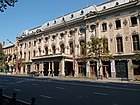Aleksander Szymkiewicz
Aleksander Szymkiewicz | |
|---|---|
 | |
| Born | November 12, 1858 Saint Petersburg, Russian Empire |
| Died | 1908 Tbilisi, Russian Empire |
| Nationality | Polish |
| Occupation | Architect |
| Buildings | Supreme Court of Georgia, Tbilisi State Conservatoire, Rustaveli Theatre |
Aleksander Szymkiewicz (12 November 1858, in Saint Petersburg – 1908, in Tbilisi) was a Polish architect who worked in the Russian Empire (primarily in Tbilisi) in the 1880s–1900s. He was a member of the City Council and municipal architect of Tbilisi from 1885 to 1891.[1][2]
In Tbilisi, he designed, among others, the building of the Supreme Court of Georgia, the Conservatoire building, the building of the Caucasian Silk Station (now the State Silk Museum), the building of the Rustaveli Theatre (with Cornell K. Tatishchev), and various townhouses, including the Andreoletti's house.[2][3][4][5] He also designed the building of the Shota Rustaveli State University in Batumi and the Court of Appeals in Kutaisi.[5] His designs combined baroque and classical elements.[2]

Biography
[edit]Born in 1858 (according to other sources - in 1860) in a noble family. Father, a civil lawyer, came from the Kovno province. Mother, Emilia-Anna Maria Petrovna, née Gurskalin, of Swedish-German origin, ancestors have lived in St. Petersburg since the XVIII century. His maternal grandfather owned the Odeon publishing house. The family lived on the 11th line of Vasilyevsky Island in Aue's house. All three sons - Pavel (1856-1900), Alexander (1858-1907) and Peter (1862-1920) studied at the Karl May School, where teaching was conducted in German.
He graduated from the St. Petersburg Academy of Arts. During his studying, he received two medals: in 1880 - 2nd silver; in 1882 - 1st silver.
At the age of 25, he went to Tbilisi, took the position of city architect. He had the rank of court counselor.
He was elected a deputy (vowel) to the Tiflis City Duma (1897-1901). He taught at the Tbilisi Art School.
He lived on 7 Chonkadze Street (own house).
In 1910, an Alexander Shimkevich scholarship was established for students of the Tbilisi Art School.
Gallery
[edit]-
Supreme Court of Georgia in Tbilisi
-
Court of Appeals in Kutaisi
-
Rustaveli Theatre in Tbilisi
References
[edit]- ^ Wystawa pt. "Polacy w Gruzji" Archived 2013-04-16 at archive.today. Poles in Georgia[permanent dead link]. Retrieved 2013-02-28.
- ^ a b c Doijašvili, Manana (2008). The Vano Saradjishvili Tbilisi State Conservatoire, 1917-2007. Nova Science Publishers. p. 87.
- ^ State Silk Museum. Retrieved 2013-02-28.
- ^ Wojtasiewicz, Wojciech (2012). "Wkład Polaków w rozwój Gruzji w drugiej połowie XIX i na początku XX wieku". In Stawowy-Kawka, Irena (ed.). Międzycywilizacyjny dialog w świecie słowiańskim w XX i XXI wieku (in Polish). Kraków: Księgarnia Akademicka. p. 65. ISBN 978-83-7638-199-2.
- ^ a b Opaska, Janusz (2012). "Działalność polskich architektów w Tbilisi w XIX i początkach XX wieku". Kwartalnik Architektury i Urbanistyki (in Polish). No. 57/1. p. 12.




